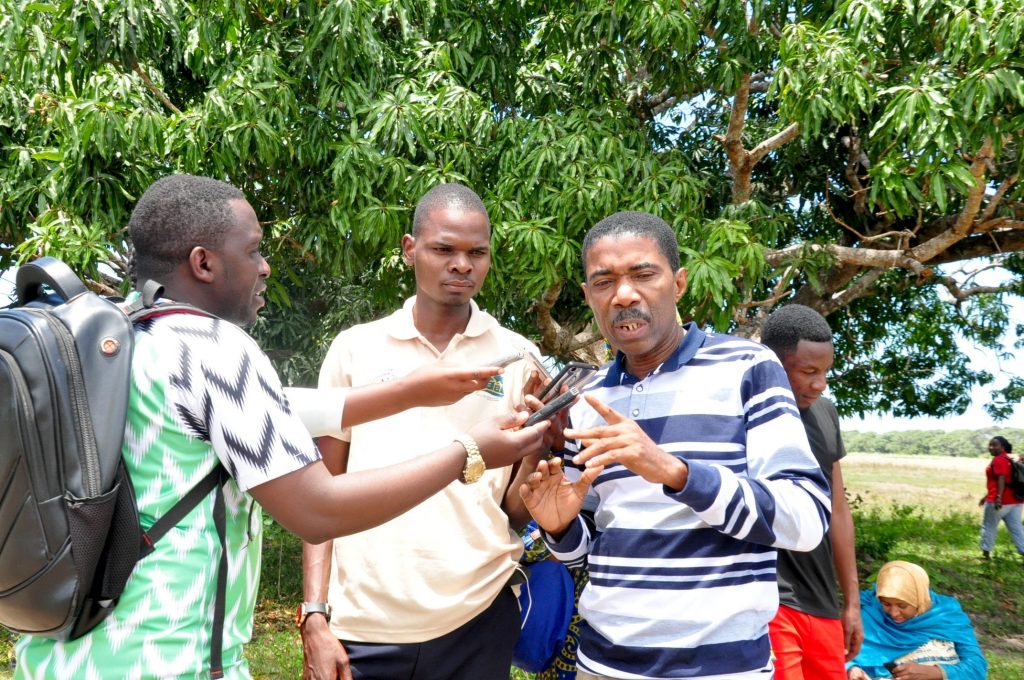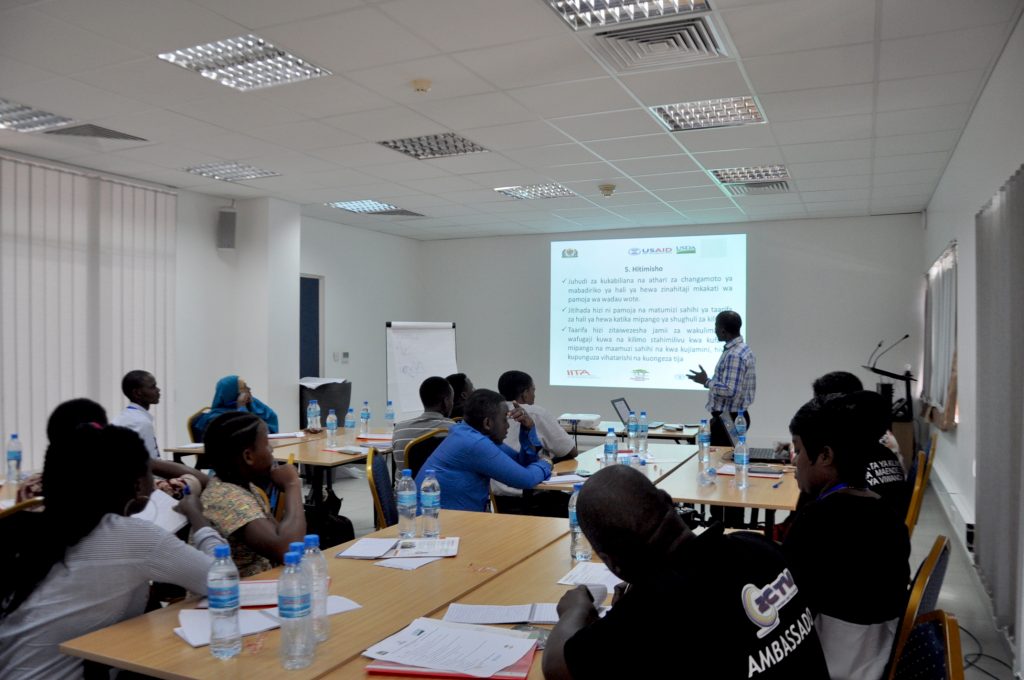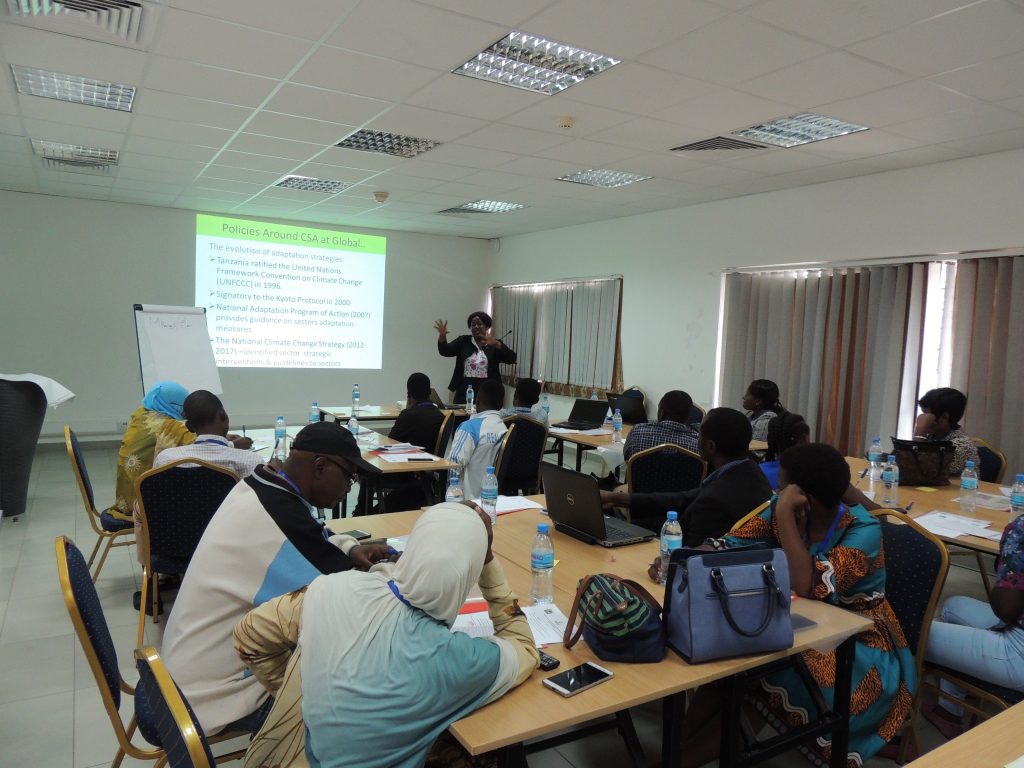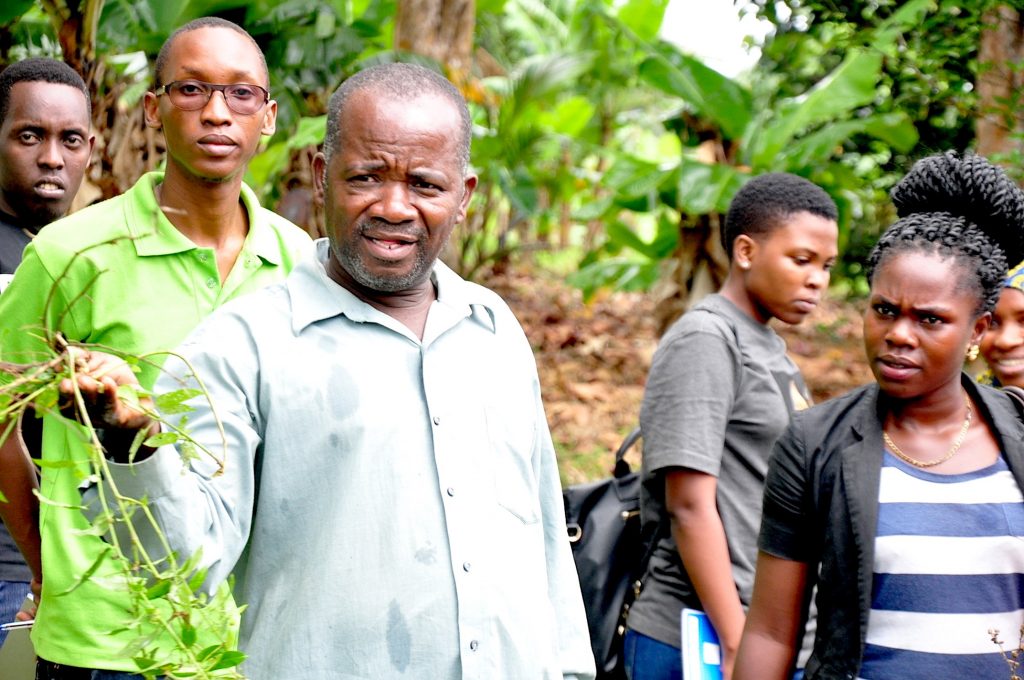
Radio journalists interview Nassor Mkarafoo, the Planning Officer for climate Change at the Ministry of Agriculture, Natural Resources, Livestock and Fisheries, Zanzibar.
“This is a rice growing field. In between the rice growing seasons, farmers often grow legumes but due to the limited rainfall they do not do well. Therefore, under this project we are introducing new drought resistant and early maturing varieties of cowpea from the Ilonga Agriculture Research Station as they can withstand the limited rain.
We are also training the farmers on good agronomic practices including proper spacing and planting of cowpea in rows. As you can see most farmers simply scatter the cowpea in the field,” said Juma Kona Mosi, the District Agriculture and Development Officer, Kaskazini B, Ungunjua, Zanzibar.
Juma was speaking to journalists from various media houses on a field visit to demonstration plots on Climate Smart Agriculture (CSA) practices and technologies in Ungunja, Zanzibar under the Building Capacity for Resilient Food Security project in Tanzania. The project is an initiative of government of Tanzania thought its Ministry of Agriculture in partnership with the United States Department of Agriculture (USDA) geared towards increasing the resilience of agriculture to climate change in the country and is funded by USAID – Tanzania. It has three implementing partners, IITA, the Food and Agriculture Organization (FAO) of the United Nations, and the World Agroforestry Centre (ICRAF).
The trip was part of a three-day training to build the knowledge base of the media on issues around climate change and building resilience in the agriculture sector. It was organized by the International Institute of Tropical Agriculture (IITA) as part of the project’s efforts to create awareness on CSA and brought together 12 journalists (5 women and 7 men) from Dodoma, Iringa, Mbeya, Pemba and Unguja.
IITA’s agronomist, Dr Freddy Baijukya, briefed the participants on issues around climate change, its causes, and its impact on agriculture, on CSA as an adaptation strategy for climate change impacts and gave examples of CSA practices.
Nassor Mkarafoo, Planning Officer, climate Change from Ministry of Agriculture, Natural Resources, Livestock and Fisheries, Zanzibar and Zainab Sheuya, Environmental Officer at the Environmental Management Unit, Ministry of Agriculture, Tanzania, briefed the media on on-going policy initiatives in the country on CSA while Emmanuel Ndaki from Tanzania Meteorological Agency (TMA) presented on climate change trends in the country over the years and TMA’s efforts to disseminate agrometeorological data.
CSA, a term coined and defined by FAO, is an approach that helps guide the actions needed for transforming and reorienting agricultural systems to effectively support development and ensure food security in a changing climate.
Shaban Nassoro from Bomba FM, Mbeya appreciated the training on CSA and the field trip noting: “As a radio journalist, the training has increased my knowledge on climate change. I have learned that while the climate is changing, there are things which farmers can do to cope such as following good and modern farming practices. I have also learned the importance of farmers following the weather forecasts and taking appropriate measures to avoid loss of their produce,” he said. “I have learned many things to share with the farmers back home in Mbeya.”
“My take away from this training is the importance of creating awareness among the farmers on improved technologies and practices to cope with climate change such as use of improved varieties and proper use of fertilizers and to plant trees. I have also learned on the importance of following the weather forecasts from TMA,” said Rose Masaka from Tanzania Broadcast Corporation (TBC) and based in Mbeya.
Making use of agromet info
Juma Kona Mosi also informed the journalists that he had recently attended a training on interpretation of agrometeorological and weather information conducted by FAO and TMA as part of this project.
“We were briefed on the forecast for this season and what we should advise farmers. They predicted that the rains will be above average to average. Our advice to crop farmers is to harvest their vegetables including sweet potato early so they are not ruined by the heavy rainfall and for rice farmers, to prepare the land early as they rain may start early.
He said they also had advice to livestock keepers to keep their cows and goats in a shed at night and not leave them to sleep in the fields as they may be swept away by the heavy rainfall. Fish farmers were also advised to repair and strengthen their fishponds so they are not swept away.
“It was the first time we have received such training and participated in such a forum to receive the seasonal forecast. Before we did not follow the forecasts much. We were not informed of what to do with the information,” he said.
At the end of the training Zainab Sheuya, MoA, appreciated the training, noting more such trainings should be conducted targeting various stakeholders in the country including policymakers, the private sector, other media and extension agents to build agriculture’s resilience to climate change for food and income security.
Nassor Mkarafuu, MANLF, urged the media to make use of all the knowledge gained in their programming as they too had an important role to play in supporting efforts to build the farmers’ resilience to climate change.
Other partners in the project include the President’s Office of Regional Administration and Local Government (PORALG) as well as regional agriculture training centers.
Disclaimer: This Building Capacity for Resilient Food Security project in Tanzania is made possible by the support of the American People through the United States Agency for International Development (USAID) in coordination with the United Republic of Tanzania. The contents of this blog are the sole responsibility of IITA and do not necessarily reflect the views of the United States Government or the United Republic of Tanzania.







No Comments